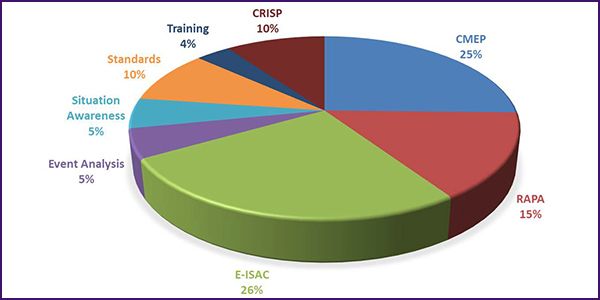NERC is planning for budget rises of 5% in both 2022 and 2023, in part because of deferring “certain human resource and technology investments” as a means of keeping its budget stable from 2020 to 2021.
The projections — $87 million and $91.4 million for 2022 and 2023, respectively — were added to the second draft of NERC’s 2021 business plan and budget, posted for comment last week. NERC posted the first draft of the business plan in May, with a planned budget of $82.9 million, just $203,000 more than the previous year. The assessment is expected to remain at its 2021 level of $72 million.
NERC Management Sees Need for Normalcy
The organization aimed to keep its budget and assessment flat from 2020 in response to economic uncertainty among the electric industry and load-serving entities. (See NERC Aims for Cost Control in 2021 Budget.) In his introductory letter, vice president and interim CFO Andy Sharp said the post-2021 budget projections “reflect a measured return” to the organization’s pre-pandemic planning assumptions.
“While NERC was able to reduce certain human resource and technology investments in the 2020 and 2021 periods, this represents a deferral of short-term cost impacts but not an elimination of these strategies,” Sharp said. “Since the bulk of NERC’s budget consists of people and technology, continued investments in human resources and software tools are necessary to support NERC’s strategic goals and mission.”
Specific technology investments cited by Sharp include NERC’s Align software project and ERO Secure Evidence Locker, set to be released in the first quarter of 2021. NERC recently received approval from FERC Approves NERC’s Align Spending Request.) Of that expenditure, $1.8 million is coming from NERC’s operating contingency reserves (OCR), while the rest is being paid through a $2 million credit facility whose servicing costs are included in the 2022 and 2023 budgets.
Despite the planned budget rise, Sharp observed that the $87 million projected for 2022 is still significantly less than the $90.8 million projected in the organization’s 2020 business plan and budget. He also noted that while NERC is projecting an assessment of $77.8 million for 2022, an increase of 8% from 2021, this is below the $80.6 million assessment projected in the 2020 business plan. A smaller assessment increase of 5.5% — to $82.1 million — is expected for 2023.
Industry Generally Supports 2021 Plans
Comments on the first draft of the business plan and budget were generally supportive of NERC’s goal of achieving a flat budget and assessment growth, though respondents made several suggestions for further measures the organization could take to ease industry’s burden as the pandemic recovery continues.
For example, the Canadian Electricity Association (CEA) noted that NERC is tracking below its 2020 budget, indicating that the organization is likely to finish the year with a higher-than-expected OCR. CEA suggested that NERC consider using the OCR to provide additional relief to registered entities rather than keeping the same revenue target. In addition, CEA asked that NERC work harder to ensure cost certainty over a three-year horizon.
In response, NERC pointed out that the OCR is being used in part to fund the Align development cost, which was not expected to fall in 2020 originally; the organization said it is reluctant to use the reserve for immediate relief in case additional unexpected spending is required. It also promised to work with regional entities on improving its two- and three-year budget forecasts.
The ISO/RTO Council’s Standards Review Committee asked for greater clarity on NERC’s plans for conducting in-person meetings in 2021. NERC replied that its $1.1 million meeting and travel budget — down 33.7% from 2020 — assumed some travel restrictions would remain in place, meaning a reduced meeting schedule for the year. However, decisions on specific in-person events will be evaluated based on pandemic conditions closer to the scheduled meeting dates.
Comments on the second draft of the business plan and budget are due by July 30. The Finance and Audit Committee will hold a conference call and webinar at 1 p.m. ET on July 23; representatives from NERC and the REs will provide an overview of their updated 2021 business plans and budgets.





